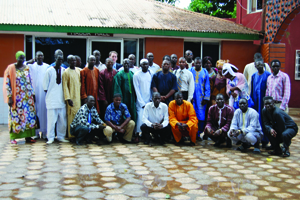Mathematics
Statistics Inside and Outside the Classroom

Being a graduate student is already a full- time commitment for the typical student. Try adding a full-time job as a high school math teacher, then throw in a position with a research institute, and that doesn’t even begin to sum up Michael Costello’s active life. However, there is much more to each of those roles than meets the eye.
With a degree in mathematics education from Purdue University, Costello pursued a master’s degree in applied statistics at American University and graduated in the spring of 2011. When not at AU, Costello was found switching roles and becoming the instructor rather than the student as a high school teacher of Advanced Placement statistics at Bethesda-Chevy Chase High School. As if his life wasn’t busy enough, Costello also worked with RTI International, a research institute, where he helped assess reading and math levels in developing nations.
Costello’s work with RTI began as an internship in the summer of 2010, and it eventually led to a position the following semester. Costello works with RTI in early- grade reading assessment in developing nations, meaning research is being conducted to look at how students are being taught reading in developing countries. Grade levels 1-4 have been looked at, and the findings are meant to determine whether the students can read and what can be done if they cannot read. Math levels are also assessed.
When the World Bank or the United States Agency for International Development (USAID) recognizes a need for improvement in a country that is often given money that can be spent on whatever it would like to improve. When educational improvement is the chosen goal, RTI is frequently into the country by the ministry of education to conduct research in order to find out what the problem really is. Many students are failing exams in developing nations, but it is not because they do not comprehend the information. In many cases, it is because they cannot read and their teachers are not equipped to teach them how to read.
Costello worked as a data manager and analyst within RTI once a week. While already maintaining a full-time teaching position in a subject for which he clearly has a passion, it is curious why Costello would join RTI and go outside of the classroom. “I wanted to experience statistical analysis work in a business setting outside of education or outside of teaching it myself, but in a real hands-on way,” he said.
And he went further than anyone could have imagined. Costello’s work with RTI took him all the way to The Gambia in the summer of 2010 for two weeks. He and his team taught basic statistical analysis to officials at the ministry of education and analyzed variables that could serve as great influences in comprehension levels, such as availability of textbooks and whether a parent can read and write. “The teachers don’t know how to teach reading because there aren’t good teacher education programs,” Costello noted. “We teach countries how to teach teachers how to teach reading.”
While analyzing the comprehension levels of the students, Costello and his coworkers collect data on variables such as the number of words that can be read a minute or the number of letters that can be identified in a minute. There are masses of data, including 200,000 students in one database, and it is Costello’s job to make sense of it all. “When I came in, they said, ‘We have a jungle of data, and we need to figure out how to tame it,’” Costello said.
The goal of all this work is to increase competency levels and train individuals in these countries in statistical analysis. Costello is currently working on a United Nations project called the Fast Track Initiative, which is attempting to see what can be done to help basic and secondary-level education in developing nations. Costello finds the initiative extremely important. “Education is the silver bullet in fighting against different factors, such as poverty,” he said.
In some areas of the world, there can be backlash towards Americans, so RTI workers are not allowed to visit the schools to conduct the research themselves. Instead, they will train the ministry officials so they can go out and correctly fulfill the testing needs. In the near future, tablet computers will become the next tool to record results once proper software is built to record the data and make it go directly into the databases.
While gathering data, problems can arise when questions are left blank or questions are skipped by accident. “In an attempt to decrease the non-response rate, we are trying to develop some type of computer interface that would ease the issue,” Costello explained.
The research is sometimes conducted in areas of the world so rural that any available resources must be utilized. For example, when electricity is not available, some RTI workers must charge their computers with car batteries.
Costello’s studies at American also helped him in his work outside of the AU classroom. While taking a course in survey sampling, he learned tools that can be applied elsewhere in his life. At Bethesda-Chevy Chase High, Costello taught a course in advanced statistical methods, which is the first course of its kind in the country. Costello utilized his AU resources in his teaching endeavors. “I had to come up with everything on my own because no one else is teaching this, so I come to my professors here and ask questions.” And, coming full circle, Costello started as an adjunct professor at AU in spring 2012, teaching Basic Statistics 202.
Costello’s days were jam-packed with taking exams, grading exams and analyzing data from developing countries. Watching Costello run from one job to the next, it would have been easy to call him the busiest man in the world, but Costello prefers to look at himself as “the luckiest man alive.”